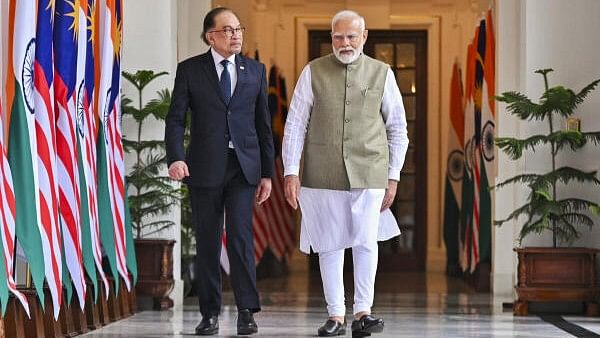
Prime Minister Narendra Modi welcomes Prime Minister of Malaysia Anwar Ibrahim ahead of their meeting at Hyderabad House, in New Delhi.
Credit: PTI Photo
New Delhi: Five years after the relations soured over Kashmir, India and Malaysia have pressed the reset button, elevating the ties to the level of comprehensive strategic partnership and agreeing to augment not only bilateral trade and investment but also to expand defence and security cooperation.
As Prime Minister Narendra Modi hosted his counterpart Anwar Ibrahim in New Delhi on Tuesday, India, and Malaysia signed a Memorandum of Understanding on Recruitment, Employment, and Repatriation of workers. The MoU is likely to streamline the movement of workers from India to Malaysia. Both governments had concerns over illegal migration and human trafficking.
“We have decided today that our partnership will be elevated to a Comprehensive Strategic Partnership,” Prime Minister Narendra Modi said after the meeting with his Malaysian counterpart. “We observed that our bilateral trade is making steady progress. Trade between India and Malaysia can now be settled in Indian Rupee and Malaysian Ringgits.”
The annual bilateral trade between India and Malaysia already reached $19.5 billion. India received a total investment worth $5 billion from Malaysia last year.
The two nations signed altogether seven MoUs and a programme of cooperation in culture, arts and heritage when the two prime ministers met in New Delhi.
Modi and Ibrahim, however, noted that the economic cooperation between the two nations had a lot of potential for expansion. “The bilateral trade and investment should be expanded. We should enhance our mutual cooperation in the areas of new technology, such as semiconductors, Fintech, defence technology, industry, Artificial Intelligence, and quantum technology.”
The relations between New Delhi and Kuala Lumpur worsened after then prime minister of Malaysia, Mahathir Mohamad, repeatedly criticised India’s August 2019 move to withdraw the special status of its Jammu and Kashmir state and reorganised it into two Union Territories.
India responded by suspending palm oil imports from Malaysia.
Ibrahim, however, sought to ease the wrinkles in Malaysia’s ties with India after taking over as the prime minister of the Southeast Asian nation in November 2022.
The two sides agreed to further intensify defence cooperation through regular exchanges and dialogues, exercises, and capacity-building cooperation. They agreed to further expand defence industry collaboration as well as defence R&D collaboration.
Jaideep Mazumdar, the Secretary (East) at the Ministry of External Affairs in New Delhi, said that India would make a one-off exception to a ban on the export of non-basmati rice to send 200,000 metric tons of grain to Malaysia. He said that India was also keen to sell military hardware to Malaysia, as well as aircraft manufactured by state-run Hindustan Aeronautics Limited.
The Tejas LCAs, manufactured by HAL, last year lost to South Korea’s FA-50s in its bid to secure the contract for supplying aircraft to Malaysia.
Malaysia is an important partner of India in ASEAN and the Indo-Pacific region. India gives priority to ASEAN centrality, Modi said after he met Ibrahim. “We agree that the review of the FTA between India and ASEAN should be completed in a timely manner. India will extend full support to Malaysia's successful ASEAN Chairmanship in 2025. We are committed to freedom of navigation and overflight in accordance with international laws and, advocate peaceful resolution of all disputes,” Modi said, sending out a tacit message to China.
“Malaysia is keen to become a member of BRICS and from our side, we have no hesitation in considering that request. This will be discussed no doubt when the other BRICS countries meet,” Mazumdar told journalists later.
